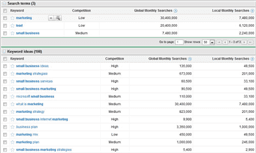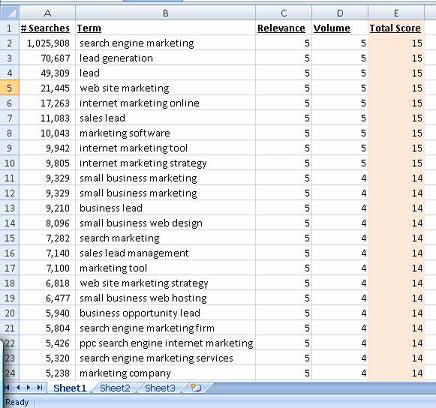Today, most internet users start the process of buying a product or service by using a search engine to find vendors and product information. How can you make sure that your business is found when these people are looking for you or your competitors? You need to make sure you rank high in the search engine results, for as many search terms as possible, and hopefully for many of the terms that are searched for more frequently. The first step toward ranking high in the results for the most common terms that people search for is to have the right keywords as part of your online presence.
Some things to keep in mind:
- You have to get on the first or second page of search results. If you are not on the first or second page of search results, it is almost like not being there at all.
- Shorter search phrases are searched for more often. Usually more searches occur for “marketing” than for “online marketing” and both of those terms are searched more frequently than “small business online marketing”.
- It is usually more difficult to get ranked on the first or second page for popular searches. Because people know that “marketing” is searched more often than “small business marketing”, more people are trying to get onto the results for “marketing” and it is usually more difficult to get highly ranked for the more frequently searched term.
Create a keyword list
Start by thinking about the 3-5 words that you think people will search on to find your business or businesses like yours. Then use keyword tools to understand how often people search on the terms related to your business. I used the keywords “marketing”, “lead”, and “small business” for this example.
Here are two tools that allow you to enter one word (like “marketing”) and get a list of related search terms as well as the number of times people search for each term.
- Wordtracker (free account needed to see results)
- Keyword Discovery
Google’s Keyword Tool is a little bit different because it gives you the number of monthly global and local searches, as well as a “competition” indicator of high/medium/low. It also allows you to put in your website (or a competitor’s website) and then it will analyze the site and spit out keywords that are related to the site. This part of the tool is useful if you don’t really know where to start on finding keywords.
 Google Keyword Tool allows you to find keywords related to your website or a competitors web site.
Google Keyword Tool allows you to find keywords related to your website or a competitors web site.
For a really advanced tool that combines a lot of data from a variety of sources, you can use the SEO Book Keyword Tool. There is a lot of data and links in the table of results it produces – I’ll leave it to you to investigate:
Combine and analyze the results
As you search, cut and paste the results into a spreadsheet. Once you have done this for 2-3 key terms, you should have a spreadsheet with 200 or 300 rows. To analyze the results and make them useful for your business, you need to figure out which keyword terms are the best ones for your company to focus on. To do this, try the following steps:
- Score each term on relevance to your business. Go through each row of the spreadsheet and score each search term on how relevant to your business it is in a new column called “Relevance”. I like to use a 1 to 5 scale, with 5 being the most relevant for my business. For example, I would give the term “small business internet marketing” a score of 5, while just the term “marketing” would probably get a 3 score, and the terms “lead crystal”, “lead singer” and “lead acid” should all get scored as a 1. These are all related to the word spelled “l-e-a-d”, but are not related to the word “lead” as I mean it, which is as a sales or marketing lead. The way I like to think about this is for the people searching on that term you are scoring, how likely is it that they will convert to a customer when they visit your website. A score of 1 means your business is not relevant to the person searching, a score of 5 means it is the perfect business for them.
- Score the terms by the number of searches. Create another column called “Volume”. In this column, we will score each term by the number of searches. Use the sorting functionality in Excel to sort the search terms from the largest number of searches at the top to the lowest number. Create another column called “Volume”. Now, in this volume column, we will score each term by the number of searches. For example, if your list contains 300 search terms, the top 60 in terms of number of searches would get a score of 5. The next 60 terms get a score of 4, continuing until the last 60 terms get a score of 1.
- Find the best search keywords. What we are looking for are terms that get a lot of searches and are very relevant to your business. For instance, “small business online marketing” is a very targeted term for our business, but it gets fewer searches than just “marketing”. Using the two scores we now have, we can create a column that gives a total of the relevance score and the volume score.Create a final column called “Total Score” and have it be equal to the sum of twice the relevance score plus the volume score. (You want to double the relevance score since it is more important than the volume score because there is usually a lot of competition for the high volume keywords and it is not worth going after unless they are very relevant to your business.) Now sort by this column to give you the terms at the top of your list that have the highest combination of search volume and relevance. Often the most relevant terms have the highest volume, but there are usually some interesting findings as well. For instance, for me the terms “contemporary marketing”, “search engine marketing company” and “sale lead” all got a 3 for a volume score, but because of their high relevance, they are in my top 30 search phrases to focus on.

Pick keywords for your blog and website
You really want to boil it down to a list of the 3-5 most important individual words, and then a list of the top keywords and phrases that you will use on your website. I usually like to focus on the top 30 terms from the spreadsheet. You should use the keywords in the page titles, URLs, meta data, and the text on the page itself.





